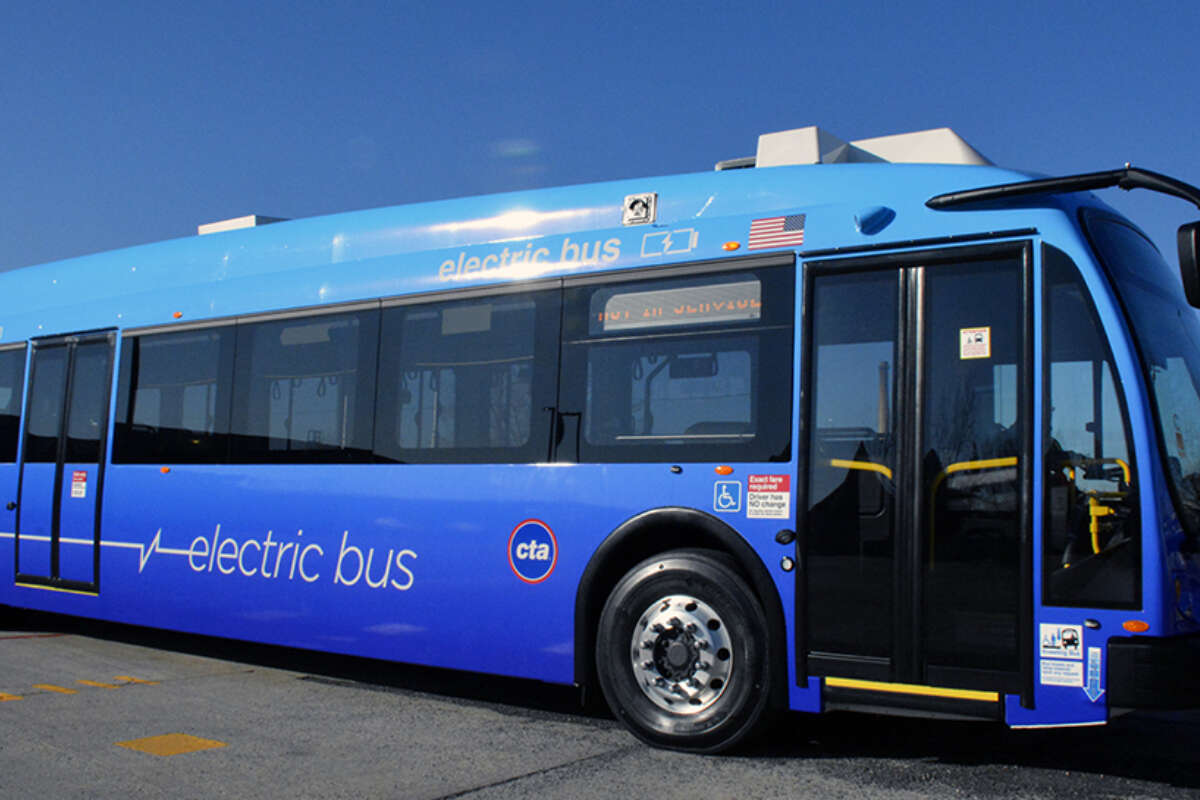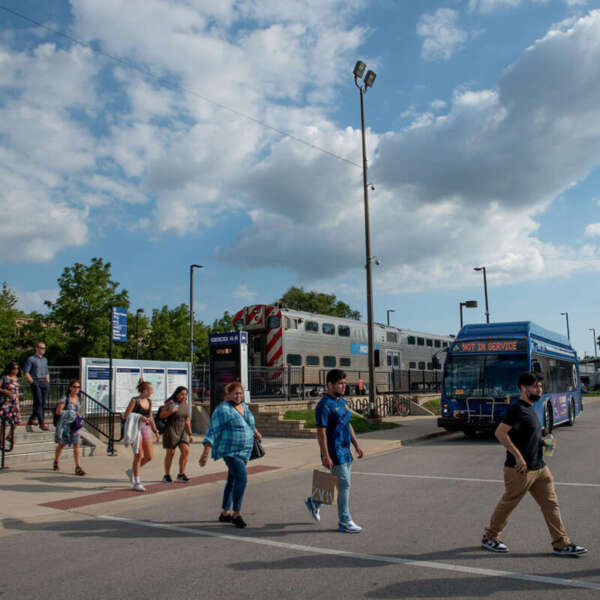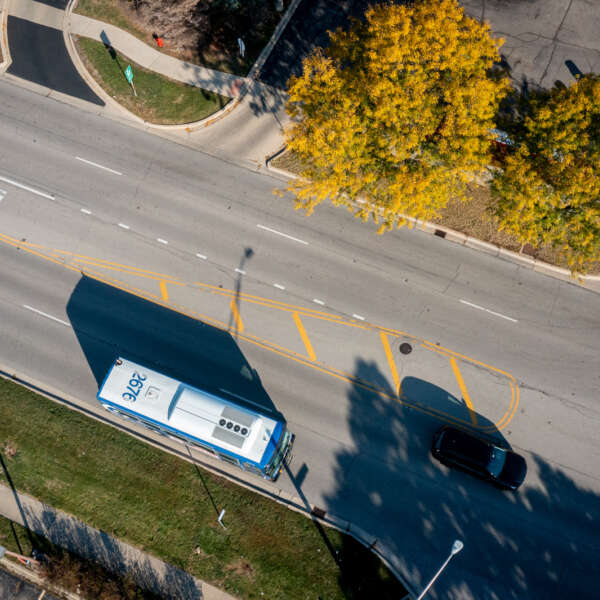RTA Board hears from guest speakers on transit system adaptation
October 22, 2021
October 22, 2021

As the RTA continues development of its new regional transit strategic plan, the agency is committed to engaging in conversations about the future of public transit in Northeastern Illinois. Two guest speakers visited the October RTA Board of Directors meeting as part of Making a Plan — an engagement effort aimed at gathering and sharing initial input on the priorities, challenges, and opportunities that the regional transit strategic plan should address.
Benjamin de la Peña, CEO of the Chicago-based Shared-Use Mobility Center, and Jody Holton, Assistant General Manager, Planning at the Southeastern Pennsylvania Transportation Authority or SEPTA, spoke to the RTA Board about transit system adaptation, or changes the transit system can make to adapt to the evolving needs of riders.
Before joining the Shared-Use Mobility Center, de la Peña was the first Chief of Strategy and Innovation at the Seattle Department of Transportation where he developed a New Mobility Playbook. He said any changes to the transit system need to be based on information and data. “Information is becoming the critical infrastructure of transportation and we need to plan for it,” he said.
While often infrastructure is thought of as the physical roads and track that carry the region’s buses and trains, de la Peña said planners can’t forget about the digital information that is collected every day from sensors, traffic control signals, cell phones, apps, and more -- and how that information can help improve the flow of transit in the region.
He encouraged the RTA Board to include a plan for managing and using the information it has on the regional transit system in a way that accelerates decarbonization, advances equity, protects privacy, levels the playing field, and considers cybersecurity. “We need to start thinking about information beyond IT departments,” he said.
The RTA Board also heard from Jody Holton, who described the SEPTA Forward strategic plan completed earlier in 2021. The plan builds on lessons learned during the pandemic with a goal of fostering “a resilient, prosperous, and equitable future.”
“The strategic plan has become more of a framework. It identifies the challenges to our region and that are disrupting our industry, it sets a vision for where we want to be headed and a few goals and strategies to get us there,” Holton said.
Holton described three major programs that are now underway to implement the strategies in the plan that will adapt the Philadelphia transit system to the changing needs of its riders. A rail transit unification project will use wayfinding and communications to provide a more seamless experience. A bus network redesign will create an interconnected network that provides frequent services with easy-to-understand routes that meet the changing needs of our region. And, a regional rail master plan will identify a long-term vision for the future of regional rail based on extensive engagement with riders and stakeholders from across the region to seamlessly integrate with the rail transit and bus systems. SEPTA Forward also detailed how the system will move to a zero-emission bus fleet and identified possible funding solutions for the future of their system.
RTA Chairman Kirk Dillard said it was helpful to hear from another large transit system with infrastructure that was built many decades ago and is now facing the challenge of maintaining and modernizing at the same time. “All the legacy systems are in this together, we can learn from one another,” Dillard said. You can watch both speakers’ remarks via YouTube.
The RTA Board will not host any guest speakers in November but will continue hearing from experts at its December meeting. The Making a Plan engagement effort also includes a guest blog series, which has been publishing new voices each week. It will also include an event hosted by the RTA and the Urban Transportation Center (UTC) at the University of Illinois Chicago, "Emerging from Crisis Wiser" a virtual discussion of the lessons mobility experts have learned during the pandemic and how they can be applied to improve regional transit. Leanne Redden will kick off the discussion followed by a panel including Heidy Persaud, Director of Transportation Equity, Center for Neighborhood Technology and Bethany Williams, Strategy & Intelligence Director, Lake County Partners, and moderated by Jessica Hector-Hsu, Director of Planning and Market Development, RTA. Additional panelists will be announced before the event.
The event is part of the UTC's Fall 2021 Seminar Series. Attendees will have a chance to ask questions of the panel and will receive a survey to provide their input on the priorities and direction as the RTA develops a new regional transit strategic plan.
Subscribe to our Newsletter
Related Articles
 Transit station activation in Uptown brings positive presence to Broadway bus route with weekly outdoor yoga class
Transit station activation in Uptown brings positive presence to Broadway bus route with weekly outdoor yoga class
On Friday mornings now through the end of the year, CTA #36 and #81 bus riders and Red Line passengers through the Uptown neighborhood of Chicago may catch a...
July 25, 2024 Join the RTA Transit is the Answer Coalition to discuss possible reforms to improve service and accountability for riders
Join the RTA Transit is the Answer Coalition to discuss possible reforms to improve service and accountability for riders
Following the introduction of legislation that proposes changes to how the Chicago region’s transit agencies are organized, the RTA continues to lead convers...
July 15, 2024 RTA releases new fare equity report, recommending fully funding and expanding reduced fare programs
RTA releases new fare equity report, recommending fully funding and expanding reduced fare programs
A new report released by the RTA in July, Building a More Equitable Fare Structure for Public Transit in the Chicago Region, recommends that the state legisl...
July 11, 2024 Homewood, Richton Park adopt transit-oriented development plans funded through RTA Community Planning program
Homewood, Richton Park adopt transit-oriented development plans funded through RTA Community Planning program
This spring, transit-oriented development (TOD) plans were adopted by the villages of Homewood and Richton Park that will make these communities more transit...
July 11, 2024 Good news: Regional transit ridership reaches new high as CTA, Metra, and Pace increase service, offer new fare products
Good news: Regional transit ridership reaches new high as CTA, Metra, and Pace increase service, offer new fare products
Ridership across Chicago’s transit system has continued to increase, with May 2024 seeing the highest ridership levels since 2019 for CTA, Metra, and Pace. T...
June 28, 2024 Legislative Update: Lawmakers pass state budget, action on transit funding still needed ahead of fiscal cliff
Legislative Update: Lawmakers pass state budget, action on transit funding still needed ahead of fiscal cliff
The Illinois General Assembly adjourned this year’s spring legislative session after passing an overall $53.1 billion budget for State Fiscal Year (SFY) 2025...
June 27, 2024